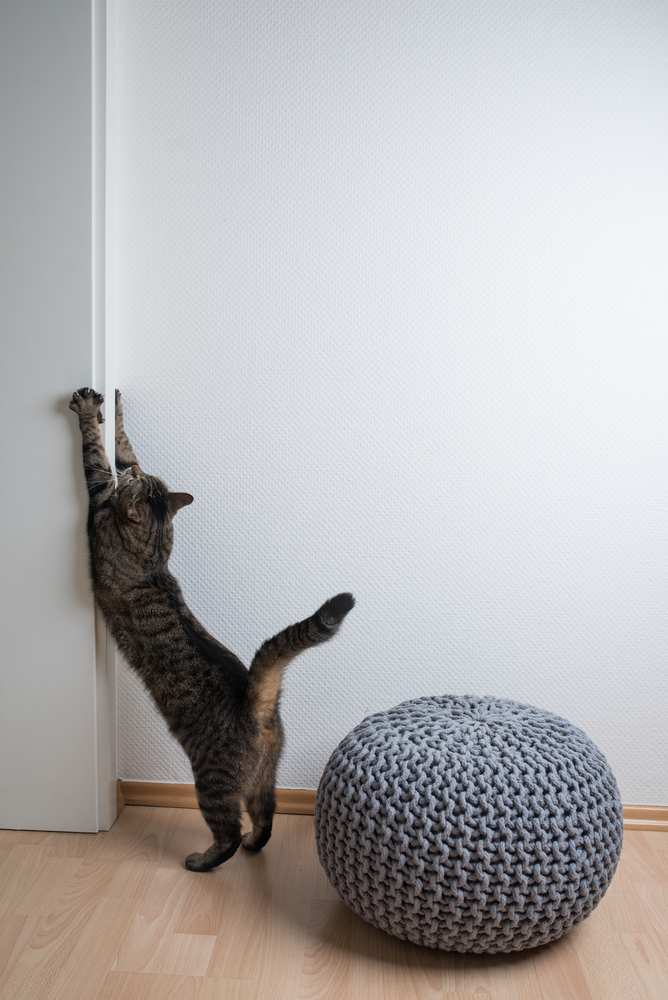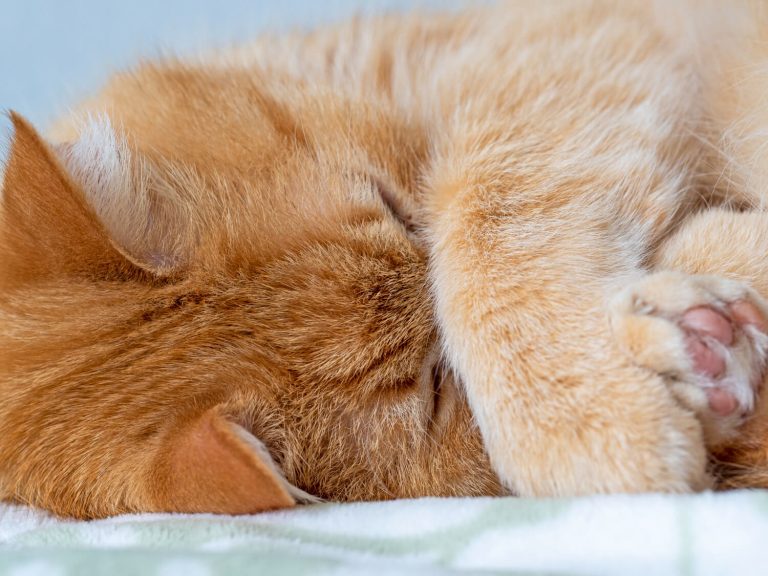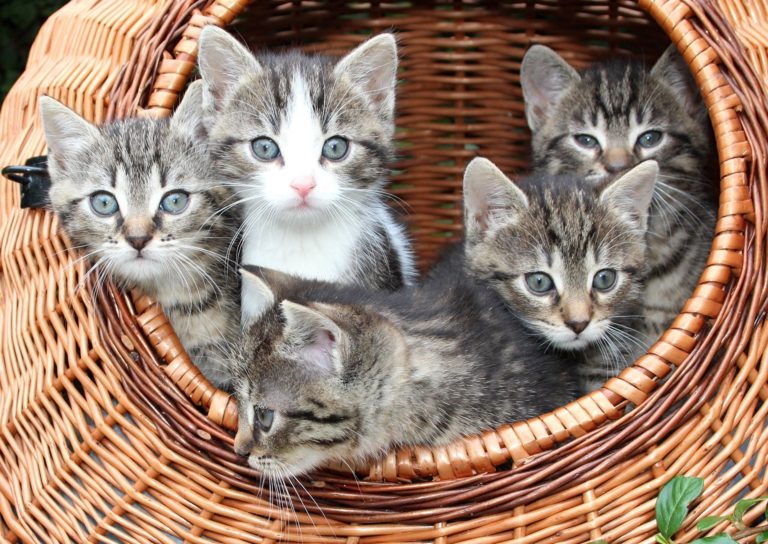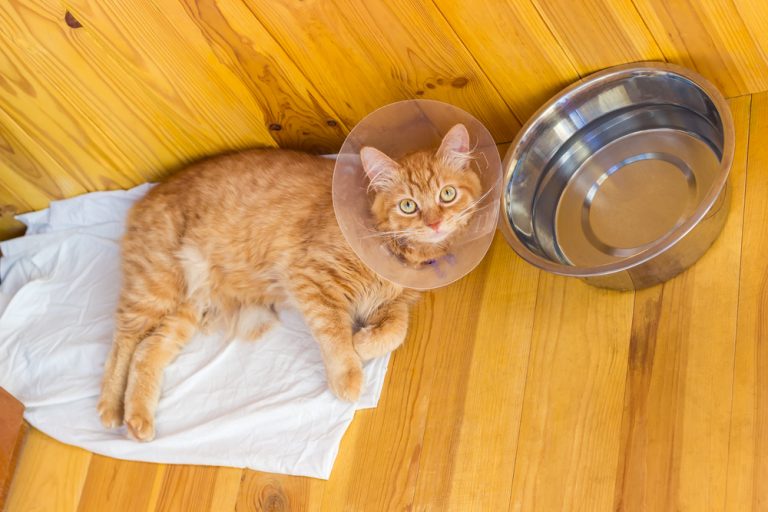Why Does My Cat Scratch The Wall?
My cat has been scratching the walls at night, and I’ve tried to find a solution. I just found out that she is scratching them because of anxiety, and it’s something I need to look into.
In this blog post, you will learn why cats scratch walls at night, how to prevent it, and if you’re already there, you’ll learn how to deal with it.
- Why Does My Cat Scratch The Wall? Detailed Guide With Everything You Need To Know.
- Why Does My Cat Scratch The Corner Of The Wall?
- Why Does My Cat Scratch The Wall And Meow At Night?
- Why Does My Cat Scratch The Walls Of Her Litter Box?
- Why Does My Cat Scratch The Wall After Eating?
- Why Does My Cat Scratch The Wall By Her Food?
- How Do I Get My Cat To Stop Scratching The Walls?
- How do I trim my cat’s claws?
- Should You Consider Having Your Cat Declawed?
- Could my cat’s scratching behavior be a sign of a medical problem?
- How can you help an anxious cat stop scratching?
- Is there a way to redirect my cat’s scratching behavior?
- What happens if your cat stops sharpening her claws on your walls?
- What are some environmental enrichment ideas for a cat that scratches the walls at night?
- How can I cover the cat scratch marks on the wall?
- FAQ on cats and scratching walls
Why Does My Cat Scratch The Wall? Detailed Guide With Everything You Need To Know.
1. Marking Their Personal Territory
We all love having our own space where we feel safe without any threats. Cats will mark their territory to assert dominance and declare ownership.
While some felines will prefer to urinate around, some will opt to scratch walls to mark their territory.
Once a cat marks an area, no other cat will try to claim it. If there were other cats there previously, then they will leave the area and prevent further battles.
Some of the reasons our furry besties will mark territories include:
a) If the feline feels threatened.
b) Introduction of a new cat or pet to the feline.
c) If there is a new person in the house/area.
d) The introduction of a new couch or furniture.
e) After moving in or out of a place.
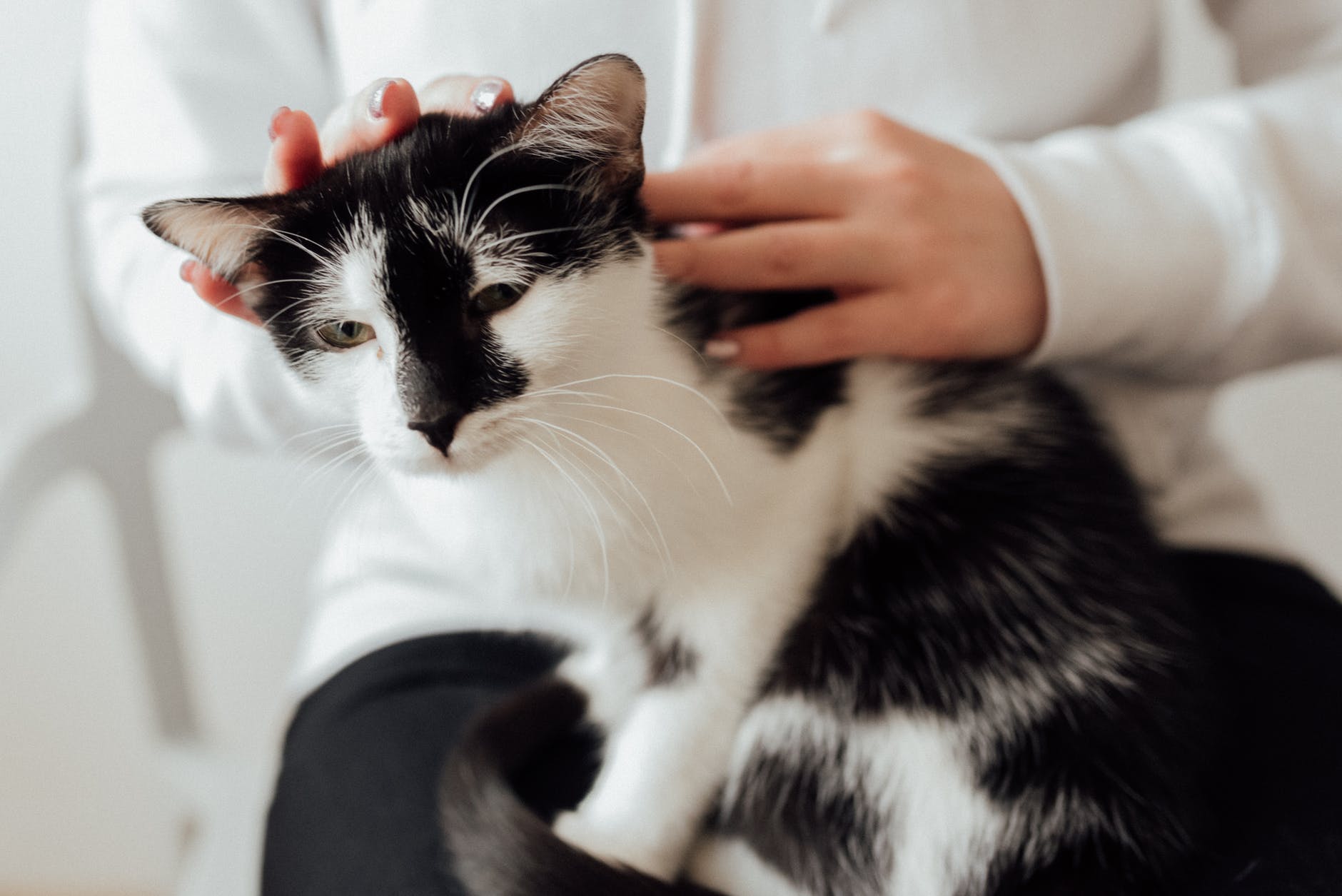
2. Claws Maintenance
Claws are very important to a cat and maintaining their sharpness is very critical. So how do our fur babies sharpen their claws?
This is where the couch or the wall comes in. Our furry besties will scratch the wall forcing the outer layer to vanish. The weak outer layer will vanish paving the way for a fresh, new, and sharp claw.
Sharpening claws is an inherited behavior that felines inherited from their ancestors. Unlike other animals, cats do not use their claws to hunt.
However, they do use them to climb trees and also for defense.
3. The Stress Factor
We’ve all been there. So stressed and wanting to take out the emotions on something.
Well, that’s what happens with cats. Our curious friends will scratch the wall and couch for emotional comfort as they try to do away with the stress.
Remember that cats are creatures of habit. Even a slight change in their daily routine or environment will stress them up.

4. Expressing Emotions
Cats will express their emotions in different ways and scratching is one of them.
Some of the emotions they may be trying to convey include:
- Scratching on surfaces to show satisfaction.
- When displeased with their environment. Your furbaby may be trying to tell you that something is wrong with their environment.
- If they are hungry and need to release some energy.
- Agitation may make a cat go on a scratching frenzy.
- Pent-up emotions like anxiety, frustration, and stress will make felines scratch walls.
A kitty’s scratching needs must be met with a variety of different scratching posts.
Punishment will only make the issue worse and weaken the relationship between purrents and pets.
Take your time to figure out how to solve the problem.

5. Boredom
Boredom will make anyone get creative and figure out ways to entertain themself. While humans may opt to cycle or play video games, a cat may choose to scratch around.
Our pet besties have a lot of energy that needs to be used. Without playing with toys or interesting things to do, a cat will find its own activities.
Keep in mind that although scratching walls is destructive, the cat may be doing it as a form of entertainment.
It is important to provide enough toys and provide an avenue to expend their energy.
6. Unfamiliar Scent
Cats have a very strong sense of smell and will detect any unfamiliar scent with ease.
In the cat world, an unfamiliar scent acts as a threat. If your furry bestie smells any unusual scent, they will mark the territory as theirs.
This they will do by either clawing walls or urinating around the area.
Felines have scent glands that will release pheromones when they claw things. These pheromones will prevent future intruders as other cats will recognize that the area is marked.
This also explains why some cats will scratch more after they sense other cats or a new person.
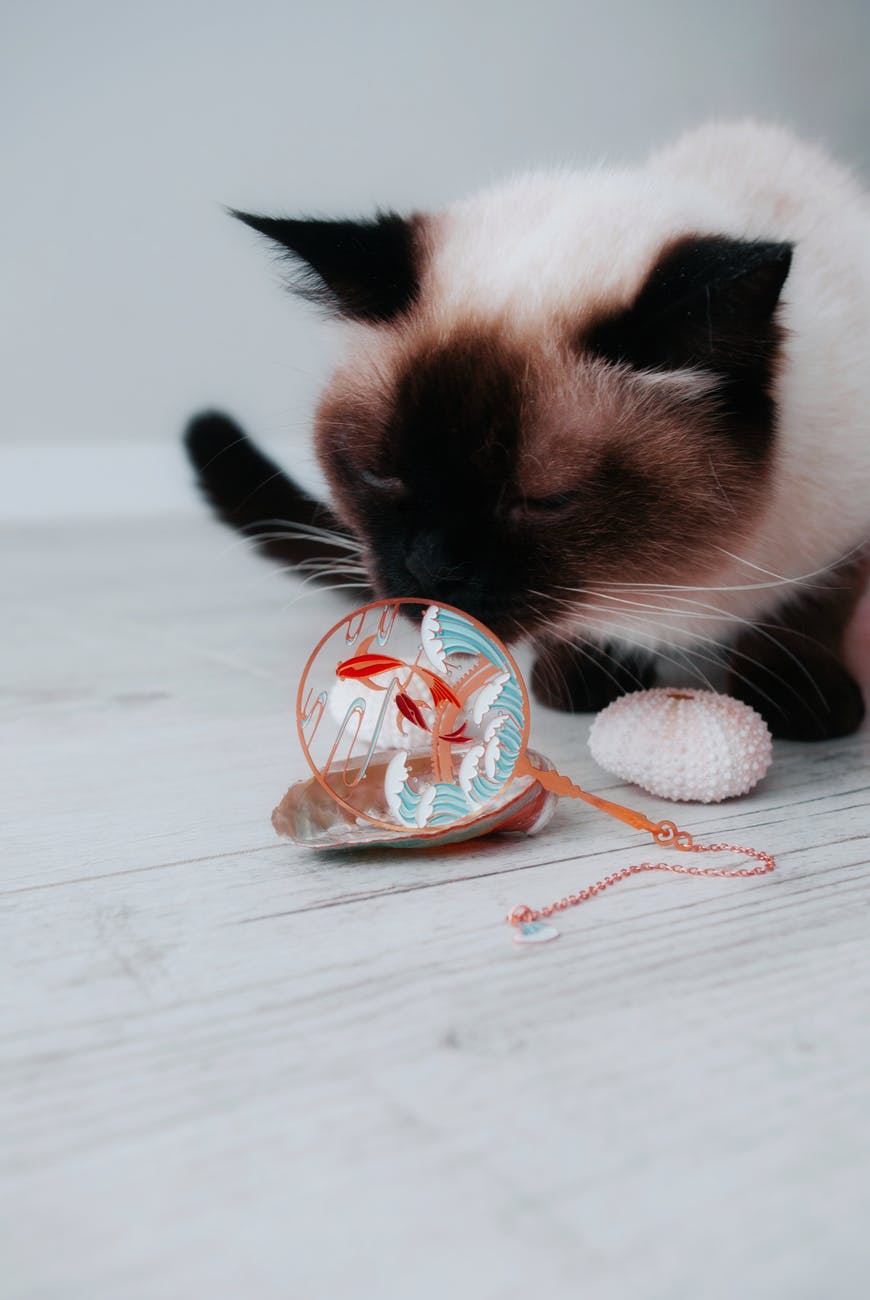
7. The Mirror Effect
By nature, cats are curious animals. Whenever they pass near a reflective surface and see their reflection, they will try to scratch since they want to know who is on the other side.
Some cats do not recognize their reflection and will think it is another cat on the other side.
Check out this article on the mirror test cat theory by the Center for Canine Behavior Studies.
8. The After Littering Ritual
Normally, after a cat uses the litter box, it will scratch around trying to hide its waste.
If the litter box is too small for the cat, it can cause them to claw out.
9. Burying Food For Later
Cats are an interesting bunch of animals. Some will scratch walls to hide their food for later.
Sometimes, the meal’s smell might have been too much for the cat. To deal with this, the feline might opt to scratch around and bury it before anyone else can see and smell it.
Other cats will only scratch walls if they don’t like whatever you’re feeding them. To avoid this, try feeding different things to your cat.
Why Does My Cat Scratch The Corner Of The Wall?
Scratching is a healthy activity for cats as it helps in maintaining the overall health of their claws. They will scratch anywhere including the corner of your wall, your seats, and trees just to fulfill that need.
It’s unrealistic to try to prevent your cat from scratching altogether, as this is a natural behavior for them. The best course of action is to redirect their scratching towards appropriate objects, like a scratching post.
Why Does My Cat Scratch The Wall And Meow At Night?
We all know cats are addicted to attention and will do anything just to gain it. This includes scratching the wall and meowing in the middle of the night.
Some cats however scratch walls out of anxiety. It is important to visit a vet to rule out this option since it can quickly evolve into a mental illness.
A change in routine can make your cat claw walls at night. Our furry besties are very sensitive to change. They will make sure to give you a piece of their mind if you disrupt their normal routine.
You know the way you sometimes wake up in the middle of the night and head straight to the fridge to find something?
Well, our cats also get hungry sometimes at night. To get your attention, they will meow and scratch the wall till you attend to them.
Interesting fact: Cats are nocturnal creatures, meaning they are most active at night. Your cat meowing and scratching the wall at night is a clear indication that s/he is active at night.
Cats belong to the apex group and are considered by scientists as the perfect predators. Seeing they are nocturnal, they will scratch walls as they try to hunt insects/mice inside the walls.
There are several reasons why cats may do this, but it is important to check their health before assuming it has anything to do with them scratching or meowing.
Why Does My Cat Scratch The Walls Of Her Litter Box?
Cats are, by nature, arguably one of the cleanest animals on the planet. They will bury their waste just so no one can see.
When your cat scratches the wall of her litter box, it may mean either of the following:
a) Expressing displeasure if the litter box is too dirty.
b) Not comfortable with the size of the litter box i.e it may be too small.
A normal litter box should be big enough for the cat to comfortably fit in. The litter should also be around 3 inches.
Avoid overfilling the litter box with litter. This is because it should be deep enough for the kitty to completely bury her waste.
It’s also important to replace the litter frequently.

Why Does My Cat Scratch The Wall After Eating?
Scratching the wall after eating is a common behavior by cats and may be caused by the following reasons:
- Food has a strong smell. Kitty may not like the scent of the food and may be trying to hide it.
- Some cats are actually shy and will feel uncomfortable eating in front of other animals. To deal with this, kitty may scratch around as they try to bury their food.
- It may be an instinctual response to leftover food.
- Kitty may be stressed and respond to diet changes by scratching the wall after eating her food.
- Expressing that they are unhappy with the food served. This may happen if, for instance, you serve your furbaby dry food and s/he prefers wet food. In response, the kitty may opt to show their displeasure by scratching the wall.
There are several reasons why cats scratch after they eat and it’s often hard to figure out what exactly is going on.
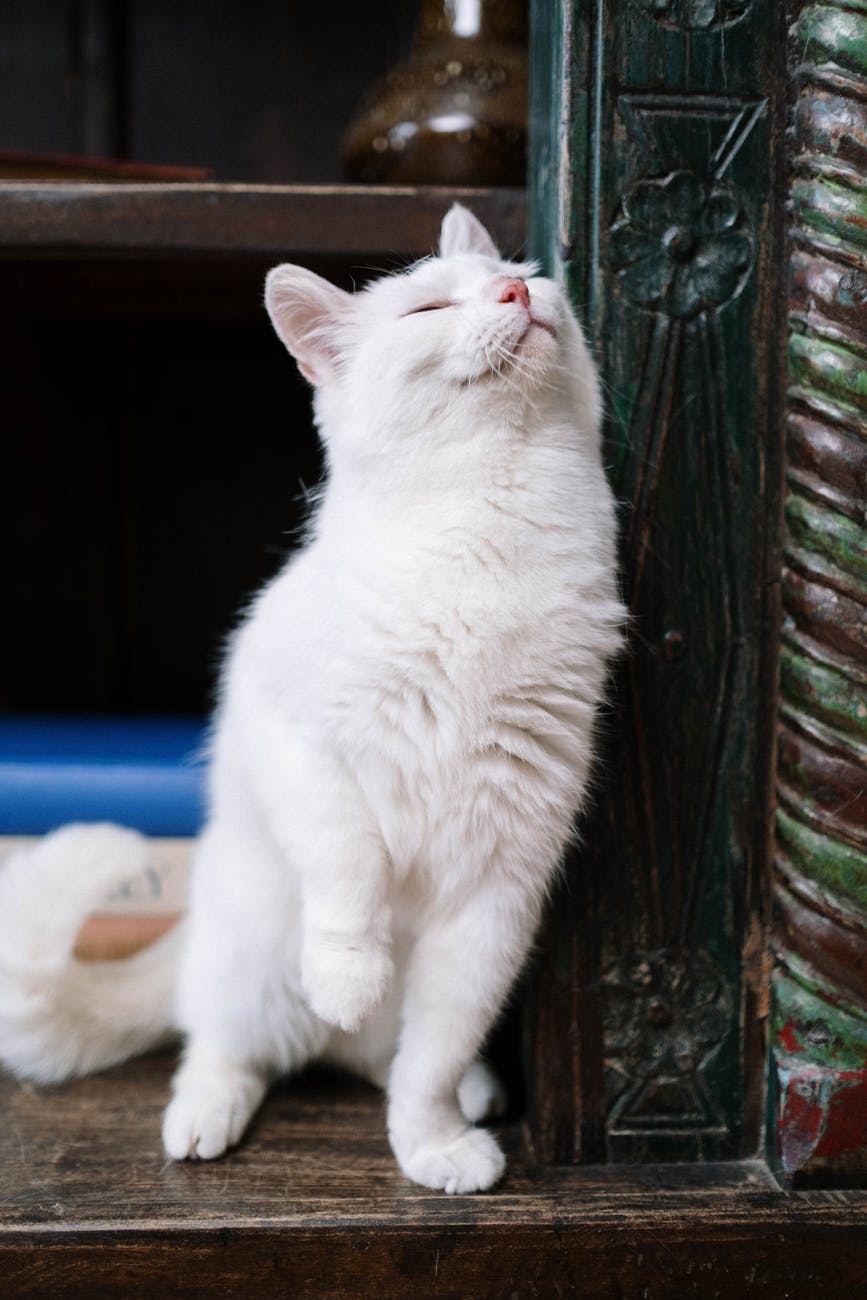
Why Does My Cat Scratch The Wall By Her Food?
As you’ve probably figured out by now, scratching is a natural cat behavior. Well, some cats will only scratch walls by their food, and here are some of the reasons why:
1. Your Cat Conceals The Odor Of Her Food
All felines are by nature obligate carnivores. This means that for a cat to survive it has to eat meat.
Especially in the wild, it is not every day that a cat will be lucky to hunt and kill prey. For this reason, cats will have an innate propensity to hoard food when there isn’t any prey around.
This behavior has been passed down by wild cat ancestors who buried their prey so they would consume it when food was scarce.
Although this is mostly experienced by wild and stray cats, your indoor kitty could also have this in them. They may choose to hide the food for later on.
2. She Protects Kittens
In the animal kingdom, it is the duty of the parent (mostly the mom) to protect the young ones.
With cats, they will protect their kittens by hiding enough food for them. The adult ones will bury the food so that other animals won’t know where the food is and steal it from them.
Additionally, by scratching, the cats will release pheromones which will fool other predators into thinking there isn’t any food around.
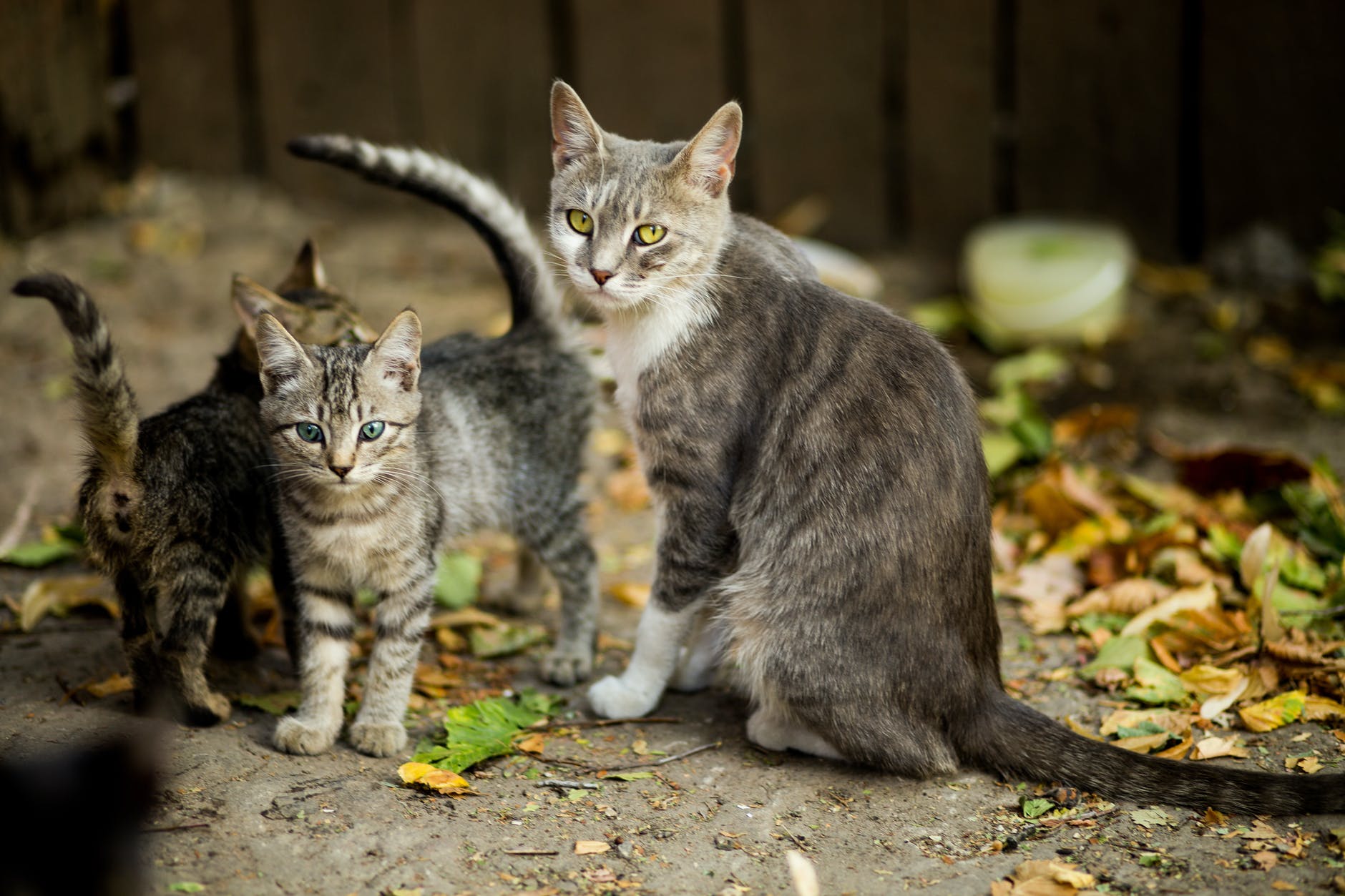
3. You Give Her Excessive Food
Cats are intelligent creatures with natural instincts that may help them overcome health problems (e.g being overweight) caused by overeating.
For this reason, your furry bestie may choose to scratch the wall or bury any extra food as they save it for later.
NOTE: It is important to provide your cat with food that s/he can finish to avoid wastage and health issues tat may arise from overeating.
4. To Keep Her Surroundings Clean
Naturally, cats are clean animals. Your fur baby may choose to hide their food due to their obsessive attention to cleanliness.
This is also why they may also scratch the wall of her litterbox after using it as they try to hide any remaining smell.
How Do I Get My Cat To Stop Scratching The Walls?
Before you try to stop your furry bestie from scratching walls, it is important to first know why they do it.
A visit to the vet is a good idea so they can rule out any medical condition.
If your furball is healthy then here are some excellent ways you can address the issue of your cat scratching walls:
1. Trim Your Cat’s Nails
The number one reason why cats scratch on surfaces is to sharpen their claws. Cats are more likely to scatch when their nails are overgrown.
To deal with this, you can opt to give your cat a trim.
However, you have to be very careful as this is a delicate procedure. One wrong move and you will leave your cat writhing in pain.
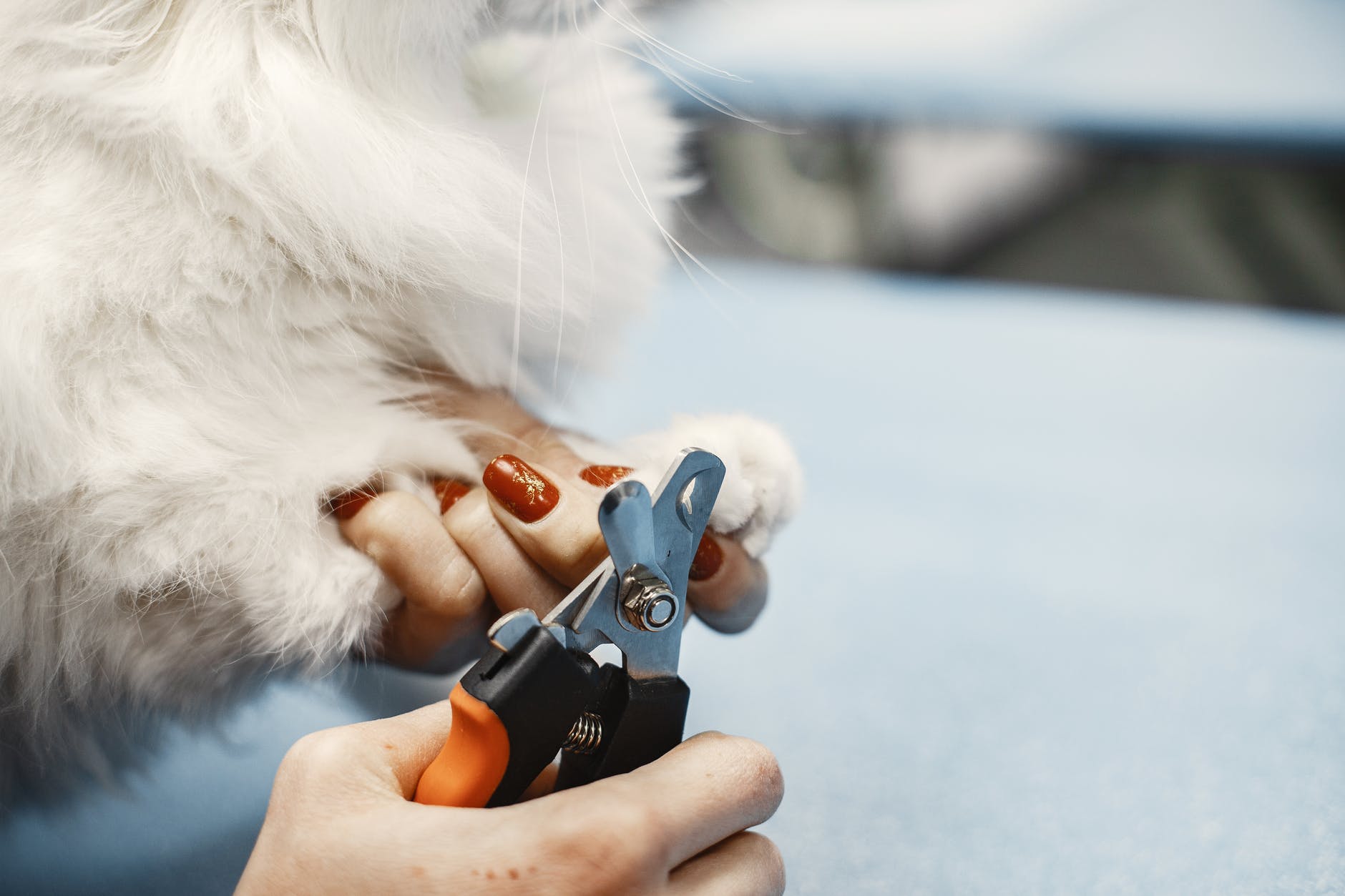
The first step would be to gain your cat’s trust and confidence. Before kitty can allow you to trim their nails, they need to be comfortable with the process.
There is the risk of your cat biting and scratching you while being trimmed. With time, however, your kitty will quickly become used to the grooming routine.
You must earn the cat’s trust so that you can successfully trim its claws.
Do not restrain a cat with towels, as this may cause undue pawing and stress it out instead of calming it down.
2. Get Your Cat A Scratching Post
The best strategy to stop your cat from scratching walls and couches is to provide her with the appropriate surfaces and items.
When cats are scratching your walls in an attempt to sharpen their claws or mark territory, try putting a new scratching post in front of the spot they like to scratch.
If you can, provide your purring friend with a range of different options for their scratching post.
A tall solid scratching post is ideal. However, your kitty will appreciate it if you attach a catnip to the post.
Additionally, cats may not like soft materials, so try out different types of scratching posts until they find one that suits them best.
The key is to make your furball comfortable enough to use the post.
Place the post near areas where your cat loves scratching. Also, make it easily accessible but still safe from harm.
Hidden objects like boxes of treats can deter cats from scratching inappropriate surfaces in your house.
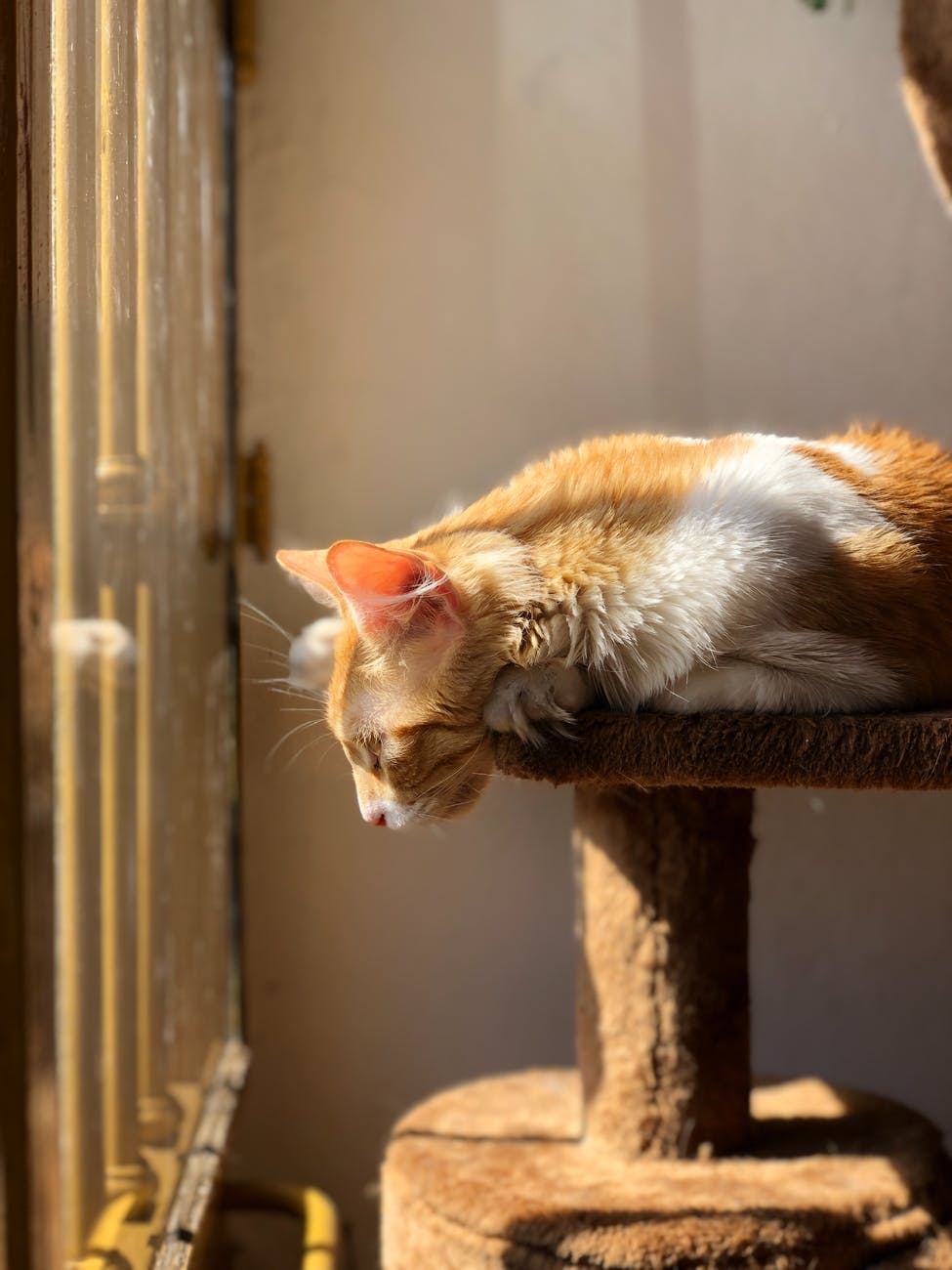
3. Pheromone Therapy
Pheromone therapy helps cats manage stress by making them relaxed and comfortable. It is a way to get your cat’s behavior under control by using synthetic variants of the cat’s natural facial pheromones.
You can encourage your kitty to stop scratching the wall and couches by rubbing its cheeks with a piece of fabric.
Additionally, you can use catnip as a substitute for motherly affection. Sprinkle some cat nip on surfaces where you’d like your cat to scratch.
4. Explore Outdoors
Cats are curious and love to explore. Sometimes, the scratching may be because the cat is feeling too restricted by the environment.
To relieve the pent-up energy, you can take your kitty for a walk or play in the backyard.
Use a ball, string, or toys.
5. Try a Special Tacky Tape
This special tape is applied sticky side out but is safe for cats. It discourages cats from scratching walls because of the stickiness.
If your cat has a habit of scratching, get them checked out by a vet for proper nail care.
6. Nail Caps for Cats
Nail caps are made of pieces of vinyl that fit over your kitty’s claws. They stay on the nails until the cat’s claws fall off naturally.
They are safe for pets and are glued with a special adhesive.
How do I trim my cat’s claws?
Trimming your cat’s nails may help combat your cat’s wall scratching behavior.
How you trim the nails however may cause a huge health issue if not done properly.
It is best if you do it slowly. Aim at only trimming a foot a day to give your cat ample time to get used to the new routine.
Procedure:
– Get your cat used to having her paws handled by petting her beforehand.
– Use a thumb on top of the paw and an index finger underneath, so you can see the pink or “quick.”
– Don’t cut into this pink portion, as it will bleed and be painful for your cat.
– Clip each nail using sharp scissors. Aim for a blunt end rather than a pointed one.
One foot of a day is enough to get used to the new routine. If you have any questions about trimming your cat’s claws, consult with your veterinarian.
Here is a video to help you out:
Should You Consider Having Your Cat Declawed?
Cat declawing is discouraged by vets since it gets rid of your cat’s main form of self-defense. In retaliation, they may express their fear through aggressive behavior eg biting.
Declawing is cruel since cats’ claws are natural and SHOULD NOT be removed.
Related article: Cat declawing: Everything you need to know before declawing your cat.
You can consult with a professional animal behaviorist in order to find out whether declawing is recommended for your cat, as well as if there are any other behavioral methods that might be worth considering.
Could my cat’s scratching behavior be a sign of a medical problem?
It is possible that your cat’s scratching is an indication of an underlying medical problem. You should be concerned if your kitty is scratching areas other than the designated scratching post.
Your furbaby may be battling anxiety and the scratching walls may be a way of dealing with it.
It is important to consult a qualified vet if you’re concerned about your cat’s scratching behavior.
Some common medical problems that can make cats scratch are:
1. Allergies
Allergies occur when a cat’s body negatively reacts to normal occurrences in its environment. Common allergens include pollen, mites, food, and other animals.
Allergic reactions lead to inflammation and itching which may cause your cat to scratch walls excessively.
2. Anxiety and stress
Cats who suffer from anxiety scratch walls as they try to deal with the overwhelming emotions. A stressed cat may also be releasing the pent-up energy by scratching the walls and furniture.
How can you help an anxious cat stop scratching?
Dealing with anxiety even in humans is a complex thing. You can however try to help your furry bestie deal with this issue.
Here are some things you can do to help an anxious cat stop scratching:
1.Reduce the perceived causes of her behavior.
Observe your furbaby to find out what is causing the anxiety. Consult your vet on this in order to be sure.
For example, you may discover that your cat will go crazy scratching your walls when you’re not around.
Once you’re aware of where the problem is, you can try to eliminate the trigger.
2. Provide her with plenty of appropriate places to scratch.
Make sure your cat has several designated areas where she can scratch without causing damage. For instance, you can provide a sturdy scratching post or board covered in sisal fabric.
3. Offer her something else to scratch instead.
Some cats will avoid using a scratching post and will try to stick to scratching walls and furniture.
In this case, provide another alternative where your kitty can scratch. For example, you can provide a toy that has a rough surface (eg a rubber ball with nubs on it) that may trigger your cat to scratch on it.
4. Train her using positive reinforcement techniques.
Train your cat by using positive reinforcement techniques. When your cat scratches appropriate objects (like her scratching post), praise and reward her with treats or petting.
Is there a way to redirect my cat’s scratching behavior?
You can redirect your cat’s scratching behavior by using some elements that your cat dislikes. For example, spraying cayenne pepper or citrus-based scents can discourage your cat from scratching walls.
Additionally, you can use ginger since most cats don’t like its smell.
Punishment won’t help and may even make the behavior worse. Cats are smart animals and will use punishment as a way to get back at you for the punishment. So it’s important to be careful about how you handle this situation.
It is important to note that behavior changing is difficult and takes time. Try providing a designated area where your cat can scratch away and not cause any damage.
A good scratching post will help satisfy this need and hopefully stop her from clawing at furniture and walls.
What happens if your cat stops sharpening her claws on your walls?
Cats need to keep their claws sharp. If by any chance kitty stops sharpening her claws on your walls, she will find an alternative.
Keep in mind that the alternative may be your furniture or bed since all your cat cares about is keeping their nails sharp.
This can be dangerous for both you and your cat, as other surfaces may not be as forgiving as a wall.
To prevent destructive nail sharpening, it is best to provide a sharpening area such as a scratching post.
Going this extra mile will save you from a lot of headaches dealing with torn sofas and beds.
You can try trimming your cat’s nails every few weeks depending on the type of cat and its claw length.
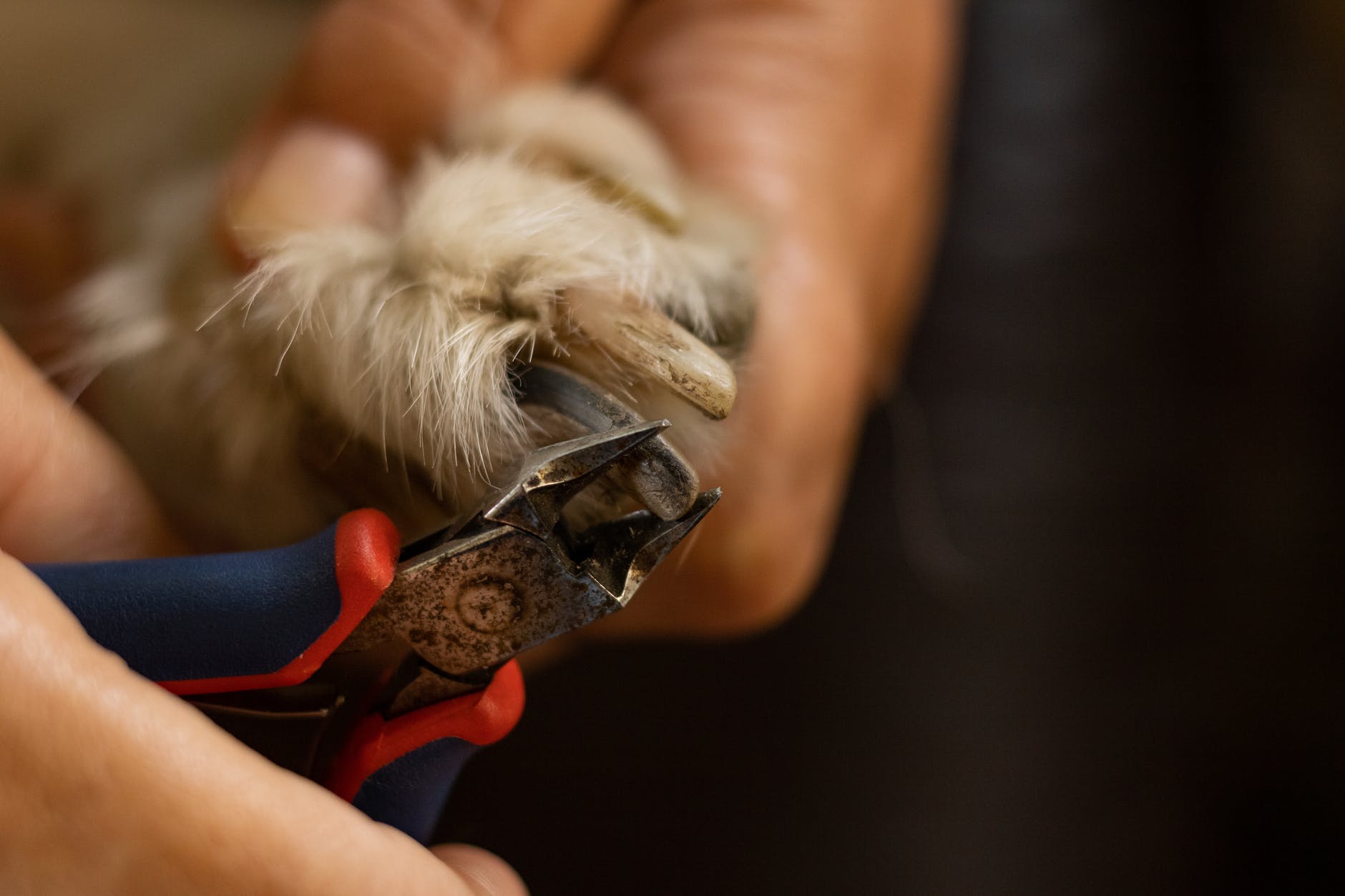
Why do cats need to sharpen their claws?
Sharp claws are essential to cats as they help in hunting down prey and defending themselves from other predators.
Keep in mind that even though your kitty is an indoor cat, s/he is still a predator.
Additionally, if a cat stops sharpening their claws, it will grow out of control and curl back into the paw pad hutting the feline. This process is called retrogradation.
What are some environmental enrichment ideas for a cat that scratches the walls at night?
There are a few things you can do to help your cat get the most out of their environment.
One suggestion is to provide them with a scratching post. This will provide an alternative scratching surface and protect your walls in the process.
To keep your creative juices flowing, try designing your own scratching post! This will enable you to customize the post to your liking.
Don’t forget to include some key features like being tall enough that they can stretch up and scratch, having multiple surfaces for them to scratch, or including a toy or two for added stimulation.
How can I cover the cat scratch marks on the wall?
1. Patch it up
Use double-sided tape to patch up the areas where the scratches are visible.
Alternatively, you can use post-it notes that will hide the scratches.
These are only temporary solutions before you can find a long-lasting one.
2. Re-paint
Use a paintable caulk or sealant. You could also try using an acrylic primer before painting over the scratches.
If you have any questions about how to cover up cat scratch marks, be sure to consult your local hardware store for advice.

FAQ on cats and scratching walls
Is my cat scratching my walls for attention?
Yes, it is possible that your cat is scratching walls just to get your attention.
It is common for cats to scratch more during the night than during the day. This is mainly because they are nocturnal and are seeking attention after everyone has gone to bed.
Could your cat scratch the wall out of boredom?
Yes, cats do scratch walls when they are bored. They need companionship and regular attention to distract them from their boredom.
To deal with this, you can provide plenty of toys to keep your pet busy and away from walls.
Is a cat pawing the wall the same as scratching it?
No, they are not the same. When a cat scratches it draws out its claws and runs them through something (wall, couch, etc).
Pawing on the other hand is when a cat places or stretches its paws towards something (wall, couch, hand, etc).
Kneading is an instinctive behavior that looks similar to scratching or pawing, but it is a sign of pleasure.
Scratching and pawing a wall may not always leave big scratch marks, but they still make noise.
What types of surfaces are cats naturally attracted to?
Cats are attracted and get an urge to scratch coarse or textured surfaces. They tend to prefer rough surfaces that create some resistance eg walls, carpets and furniture.
Do declawed cats still scratch walls?
Declawing cats removes their ability to scratch around. Without their claws, it is impossible for them to scratch.
One of the main reasons why cats scratch is to keep their claws healthy. However, a declawed cat has no claws to sharpen.
How can I prevent my cat from causing damage to the walls?
There are a few things you can do to help prevent your cat from destroying your walls.
One is to use a spray bottle and spray your walls with smells that your cat doesn’t like (eg ginger, citrus-based smells, etc).
Use an alternative to regular tapes, like double-sided tape or carpet tape. This will help keep your cat from scratching the walls out of boredom.
Another option is to use soft paws, which are plastic covers that attach to your cat’s claws and help prevent them from causing damage.
Keep in mind that soft paws should only be used until your cat stops scratching the walls, then they should be removed.

